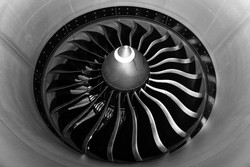Titanium in the gas turbine engine
Advancements in gas turbine materials have always played a key role. The higher the capability of the materials to withstand elevated temperatures, the higher the engine efficiency is. Moreover, materials with high strength-to-weight ratio contribute to weight reduction. While aluminium-based alloys offer excellent strength-to-weight ratio, their use is limited to temperatures below 130 °C, restricting potential application within gas turbines. Stainless steels offer similar strength to most titanium alloys, but with a significant density penalty of over 50 %. Against this backdrop, EU-funded researchers sought a titanium alloy capable of being fabricated into intermediate compressor casings and enduring operating temperatures at least 50 °C higher than the standard. Their research was carried out within the scope of the project GOTA (Greater operating temperature alloy). The material should not only withstand higher operating temperatures but also be compatible with industrial-scale casting, forging and welding of aerospace components. The first step was to conduct extensive tests of samples, focused on their thermal behaviour. The selected titanium alloy, referred to as Ti+, exceeded targets for strength and creep resistance at elevated temperatures. Ti+ was subsequently subjected to forming tests, including sheet rolling, ring rolling, gravity and centrifugal casting, and button melting. GOTA results support the potential of Ti+ to be used in intermediate compressor casings operating at temperatures 50 °C higher than materials currently used. Increasing the operating temperature will open the way for aero engine designs with reduced fuel consumption, and thus lower carbon dioxide and nitric oxide emissions.







